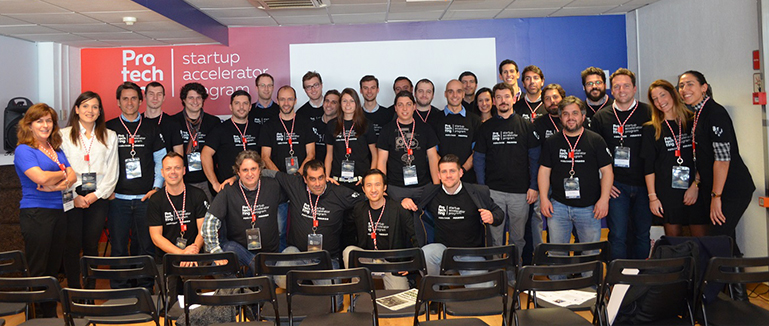
by holiveira | Oct 11, 2017 | Corporates
Startup culture has its own language. Many of the terms tossed around sounds like something out of a Sci-Fi movie, or an episode of ‘The Big Bang Theory’, at the very least…
In fact, hearing the language of startups is a lot like watching a foreigner that kind of speaks Spanish trying to have a go at Portuguese. Some words you almost recognize, others you get a sense of what they’re hinting at. But it really doesn’t amount to anything, if you’re looking for your native tongue.
The truth is, most of these terms have come to stay. So there’s really no use in trying to swim against the current and ignore them. The innovative businesses popping up every week, feed and bask in this new ‘lingo’, so, if you want to bring your organization closer to innovation and growth, you better start by understanding what promising startups are actually talking about.
So, to help you get started, here are some key jargon:
Incubator: A space for businesses to research, gestate, and grow before attempting to hit the market. Think about a species of animal that can stand as soon as it is born and then walk and jump 24 hours after. OK, so that is not the type of animal that belongs in an incubator. Incubators are good for seed stage companies, that really need more time and care. Incubators are often also coworking spaces.
Accelerator: An accelerator is much like an incubator, but with more access to resources, mentors, know-how, investors, and corporate connections. In an accelerator, a company might outgrow its natural pace, hence the ‘acceleration’. Accelerators are spaces that have the resources to help a startup fail and try again.
Pitch: A presentation in which a startup founder attempts to persuade an investor about the viability of their company. The presentation varies, based on the specific purpose of the pitch. Brief presentations in which an entrepreneur provides a 30 – 60-second overview of their idea, business model, and marketing strategy, with the purpose of attaining a followup audience with an investor are described as ‘elevator pitches’. Formal, detailed presentations utilizing power point type slide decks, with the specific objective of seeking investment from angel groups or VCs, are known as ‘investment pitches’, and usually, amount to 3 minutes.
Burn Rate: The rate at which a company spends net cash over a certain period, typically a month. Investors are not very keen in putting their money where the burn rate is excessive, apart from some few exceptions, like Uber. In simple words, its how fast startups are blowing the cash they got in the first place.
Seed Money: The first investments in a company by someone other than the founder. The term comes from planting a seed for the first time. This is the initial round of capital for start-up companies, typically provided by angel investors through preferred stock or convertible bond-type instruments.
Unicorn: A company that has magically been valued at over $1 billion (1 million millions). Curated fashion platform Farfetch, founded in Portugal, is one such example. It’s a steep road, but all startups dream of becoming Unicorns…
You are now ready to enter the world of startups. But tread lightly, it a chaotic space, constantly changing and evolving. If you need some guidance, Beta-i is always here to help you navigate the entrepreneurial ecosystem.

by holiveira | Oct 11, 2017 | Corporates
Yes, Porto Business School, Beta-i, Bright Pixel and Lionesa all teamed up to launch REACTOR, an ambitious project that aims to support innovation and entrepreneurship in Oporto. First presented at this year’s “Pixels Camp”, on the 28th of September, REACTOR intends to disrupt corporate innovation, by exposing them to high doses of entrepreneurs and startups, starting next November.
It’s operating base will be the North of Portugal, but the idea is to reach the rest of the country, and the European (and global) market. REACTOR’s main mission will be to promote innovation, bringing corporates, entrepreneurs and startups closer together, and allowing them access to tools as critical as consultancy, acceleration, investment, countrywide and international networks, or community, among others.
Porto Business School will be in charge of the coordination, management, and implementation of the project, very much in line with its current strategy, and all the partners will contribute with their specific know-how and skill set.
For Beta-i, “we see here a clear opportunity to create synergies, not only in the acceleration field, where we can obviously make a difference, but also as a chance to be part of a project with global reach and ambition, in a collaborative system, that will help generate critical mass around the second biggest city in Portugal. This strategy, that’s intended to create positive disruption, in the way we look at the Portuguese innovation map, is very much in line with our goals and mission as an organization, and with our plans for expansion, home and abroad”, comments Pedro Rocha Vieira, CEO, and co-founder at Beta-i.
“REACTOR represents a strong partnership, with the right players, and the proper ingredients to develop a new and ambitious innovation concept, while contributing to the development of a new innovation ecosystem, from Oporto to the world”, he adds.
Lionesa, a creative hub that harbors hundreds of companies and almost 5.000 collaborators, will act as the ‘cradle’ this project. As Lionesa likes to say, “a business that makes nothing but money is a poor business”. Henry Ford quotes still rule!
PS – if you need more information regarding REACTOR, just drop them an email, at reactor@pbs.up.pt.



by mafaldachaves | Oct 11, 2017 | Corporates, Startups
In 1964 someone said there would be no market for television.
“Television won’t be able to hold onto any market it captures after the first six months. People will soon get tired of staring at a plywood box every night.”
This was no other than… Daryl Zanuck, the co-founder of 20th Century Fox, one of the biggest producers of televised content.
Let me give you another example.
“I think there is a world market for maybe five computers.”
Said Thomas Watson, president of IBM in 1943.
More recently, someone had hesitations about the first iPhone at its launch.
“500 dollars? I said that is the most expensive phone in the world. And it doesn’t appeal to business customers because it doesn’t have a keyboard.”
This was Steve Ballmer, CEO of Microsoft in 2007.
What can we conclude from these incidents?
- As a CEO or co-founder of a large company, if you sound confident, you can say whatever you like!
- But also that the future is very unpredictable, and increasingly more so. When it comes to technological innovations and digital transformation, not even those with access to information on industry knowledge and trends or current industry leaders can anticipate what is going to happen.
As the speed of change increases, unpredictability is becoming the norm rather than the exception. This game of trying to predict the future is getting old. It’s almost turning mystical, like looking into a crystal ball. It has become too risky for most companies to put all their bets on these unreasonable certainties.
Nowadays, with so many future possibilities, the only way for an organization to remain competitive is through a continuous desire to learn and a willingness to test things.
It no longer makes sense for a company to look inwards, to what is known and familiar, in search of innovation and transformation. Or even to focus on developing new solutions and technologies in-house. Most of the ideas that arise, probably have or are being developed by someone who more focused and specialized. Most of the time, these teams are startups looking for opportunities to collaborate and who dream of seeing their solutions used by customers.
Companies possess industry knowledge, resources, access to a large customer base, but they seek new ideas, the opportunity of testing and experimenting without too much risk and becoming agiler to be able to do this. That is exactly what startups have to offer. In turn, they are looking for industry knowledge, resources, and access to a large customer base. All things that corporates can offer.
If these two happen to have a profile on Tinder, I’d say it is a perfect match. But as you know, even for the perfect match, relationships are never easy!
This is why at Beta-i we have open innovation programs. We do what tinder does. We facilitate these “dates” between startups and corporates. Through our programs, clients can attract the most innovative ideas, from all over the world, technology-based startups, who are excited and ready to collaborate and adapt their solutions to your business reality. Our programs, which often happen at a global scale involve the entire organization and bring together diverse business areas to create interdisciplinary teams. This way we foster an environment for deep cultural transformation to occur in a natural way. And it really works! Our clients can prove it.
There’s one last statement, that I’d like to share with you.
“Neither Redbox nor Netflix are even on the radar screen in terms of competition.”
Can you guess who this was? You’re right, it was Jim Keyes, president of Blockbuster before it’s doom!
Had blockbuster collaborated with Netflix or Redbox, or other startups of the sort, they could now be one of the biggest providers of online entertainment content.
Don’t make the same mistakes that were made in the past. It’s time to collaborate with startups and not miss the opportunities of the future!
If you want to know more about our open innovation programs, have a look here!

by amalienaustdal | Oct 10, 2017 | Corporates, Investors, Startups
Frank Borman, a retired NASA astronaut, once said: ‘exploration is really the essence of the human spirit’. Now, you don’t have to go all the way to space for exploration. There are plenty of wild and unexpected adventures made possible by a short flight. It seems like more and more people share the beliefs of Frank Borman. Nowadays, more people are traveling, going to far-away destinations, whilst seeking more immersive experiences.
More than ever, we are looking for ‘exploration’ and not just ‘holidays’. It is changing the face of the travel industry. New niches are being created, with new solutions entering the market. Three core themes driving the disruption of the industry are demand for sustainability, future traveler’s needs and innovation.
Sustainability
Not only have we become more aware of making our travels a lasting memory, we are also seeking to make a positive impact on the destination we travel to. The travel industry has become the largest industry worldwide, increasing our responsibility to protect and preserve the places we love to explore. Travelling is associated with a large carbon footprint and the derogation of natural and cultural heritage. As we are becoming more aware of this, travelers are starting to demand green and sustainable alternatives at every step of the journey. Now, 70% of travelers expect companies to demonstrate a commitment to preserve the natural environment. Many local and national economies rely on tourism, yet many are starting to realize the negative impact of tourism. Spain is a prime example of a country struggling with mass tourism. Forcing the nation to take constricted action to reduce the number of visitors in its most popular destinations. Thus, there are many changes being made in the industry; new regulations, innovative technologies and sustainable alternatives to combat the bad rep of traveling as an environmentally polluting activity.
The Future Traveler
Travel is about consuming experiences, and we all want a unique experience tailored to ourselves. Technology is making this possible. In turn, technology is making the needs of the future traveler more complex and higher than ever. We want more out of each experience. Each encounter on the travel needs to be unique, memorable, adventurous, effortless and personalized. The future traveler has technology at their fingertips, with access to personalized information, whenever, wherever. Before the trip, technology allows for a more seamless integration of planning tools for easy booking of hotels and add-ons tailored to your interests. During the trip, the connected traveler can easily navigate their way through the final destination and easily discover the offers around you. As a result of social media, the future traveler is seeking unique experiences, going off the trail for a killer image. It is no longer possible to satisfy the needs of the future traveler without innovating and offering tailored services to the individual.
Innovation
There are many technological innovations entering the tourism industry today. Crowdsourcing sites with reviews and advice make choosing restaurants and experiences easier. The sharing economy gives rise to new options in accommodation, such as Airbnb and Couchsurfing, as well as cheaper transportation and meal offers. Online platforms are making it easier to plan your holidays. Virtual reality is making it possible to experience your holidays before you go, to get a glimpse into what you can expect. Augmented reality can be your personal tour guide, tailoring the guide to your interests instead of a generic group tour. There are countless new innovations entering the market every day, improving our travel experience throughout the journey.
It is not a coincidence, that these three areas are in fact the three core themes covered for the Lisbon Tourism Summit. The Lisbon Tourism Summit is an event dedicated to the tourism industry; its innovators, challenges, and developments. Seeking to inspire, demonstrate new solutions and bring together key players in the industry.
As a final note, I will leave you with another quote. Some food for thought.
‘The traveler sees what he sees. The tourist sees what he has come to see” – Gilbert Chesterton.

by ggomes | Apr 12, 2016 | Uncategorized
Two Days until Demo Day at Protechting… Tik Tok..
Two months ago Protechting by Fosun & Fidelidade kicked off, but if at first sight it seems that time just flew by, for each one of the selected teams, each day was a hard battle to take their startup to the next level. If at Beta-i everyday was a learning opportunity through access to workshops, talks and meetings with mentors and experts, outside they had the challenge to get user feedback, test their platforms and approach potential clients.
It all started two months ago and now, only two days away from the Demo Day, the teams are collecting all the relevant and final info and goals achieved to craft their pitch. Last week we did a status update on three of the teams and now we bring you news on other seven teams.
Here are the other seven teams and what they’ve been working on
iVigilate

iVigilate is working on behavior monitoring using a web-based platform and beacons that are strategically placed in the location and the person to monitor. The technology is aimed to help control individuals that might not be in their full capacity, such as elder people and children.
What initially started as an attendance management platform is now designed for the Healthcare and Security markets. They have a working pilot, waiting to be implemented at Hospital do Mar and iVigilate is also working with BClose on a platform targeted to the Security market, allowing to monitor security rounds.
It’s always interesting to witness first hand when two Startups have the chance to partner inside an accelerator.
BClose

What started as a platform to standardize all the interfaces of different security equipment at big companies is now a B2C IoT portal that joins more than 50 features. The app analyzes real-time info on human behaviors, detects patterns and then suggests different actions according to the context. They already have a working platform where diverse devices are integrated, all related with safety, health, wellness and energy management but Bclose gets stronger as more services are continuously getting included.
They’re already in Spain, France and Switzerland and they plan to approach the Asian and American markets. Fidelidade is doing an internal testing with the app and José Villa, Marketing Manager at Fidelidade and one of their Coaches at Protechting has been one of the great assets, providing valuable inputs to the team.
MotionsCloud

When you detect some loss or damage at your house you usually call your insurance and they send an expert to evaluate, right? These are claim experts and even nowadays they still take almost a whole day to do the evaluation and the full report they need to deliver.
MotionsCloud developed a mobile solution that allows them to complete the whole process in about 3 hours, saving extra time and costs. They already have a (paid) working pilot running with a claims firm in Germany, where they’re based. It was there that Lex heard about Protechting and immediately knew it could be the perfect accelerator to work on some of their biggest challenges.
Truth is it’s usually not easy to get access to some of the top players in the market, and right now the team has access to great insights, feedback form different departments and also the chance to personally follow the day of a Claim expert. Thanks to Nuno Soares and the other Coaches from Fidelidade a possible pilot with the insurance company is now in due diligence stage.
Consulta do Viajante
 Diogo works as a doctor in a Clinic and when he arrives home he still has the opportunity to do more appointments. How? He created a telemedicine platform where patients can schedule their appointments, do the video consults, pay and receive their prescription. Right now is already working in the area of travelling appointments, “Consulta do Viajante”, but the plan is to expand to other areas such as General Medicine, Pediatrics and Mental Health.
Diogo works as a doctor in a Clinic and when he arrives home he still has the opportunity to do more appointments. How? He created a telemedicine platform where patients can schedule their appointments, do the video consults, pay and receive their prescription. Right now is already working in the area of travelling appointments, “Consulta do Viajante”, but the plan is to expand to other areas such as General Medicine, Pediatrics and Mental Health.
Right now the payments and prescriptions are made through third parties so one of the main challenges is to work on a way to do them internally.
One of the most valuable learnings was when they heard about NPS (Net Promoter Score) and how to get and work on customer feedback, a talk by Diogo Teles, from FaberVentures.
How did Diogo discover about the Protechting program? He worked as a volunteer three years ago in a Beta-i event and since them he stayed tuned until he saw this was a chance he could not miss.
They’re currently talking with Fidelidade to implement a pilot focused on Occupational Health.
Kylega

When something unfortunate happens to someone, it’s never easy to have their assets distributed.
With the premise of “Keep your legacy”, Kylega started with the goal of allocating any person’s assets to his relatives in case of death. The concept created by three Iseg Alumni has now evolved to much more than that, allowing anyone to manage all their assets in their life: from bank accounts and houses to social media profiles.
For each one of them, the user defines an accountable person and a general “keeper” that is responsible for activating the distribution when something happens.
They have a working platform that is now being tested inside and outside Fidelidade to get as much feedback possible. All these inputs will be included on the final Pitch, one of their priorities in these final days.
So far Protechting has helped them work on issues such as the user experience, design and how to adapt their product to different corporate solutions.
Lifesymb

When the grandfather of the founder suffered from several strokes without being able to fully recover due to the lack of the proper follow-up and help, Lifesymb was born.
This is a platform with a complex algorithm that uses a camera and sensors to analyze your posture and body movements. After the scan the platform recommends exercises, through video tutorials, or even a physical therapist if it’s more serious.
With a working platform, posture corrections and injury healing were some of the tested features with the athletes of last Iron Man Triathlon competition and also at the main triathlon competition in Stockholm. Through Fidelidade they managed to make a deal with Multicare for a pilot starting in July with Luz Saúde clinics.
Queseguro

We all know how choosing the right insurance for your needs can become a real challenge.
Companies that show themselves with more transparency to their clients can develop a more close relation with them, and the evolution of the market points in that direction. Miguel lived abroad for 12 years, where he had access to insurance aggregators and when he arrived again to Portugal he decided to work on his own platform.
QueSeguro was created two years ago and is now evolving with more insurance companies being involved and a growing user base. The relation with Fidelidade was a great opportunity for both sides to understand each other and see how they could eventually work together.
10.000€ and a Roadshow to China are waiting for the winners this Thursday
All these entrepreneurs are giving their best to steal the show at the final presentation and win the 10.000€ first prize or a place in one of the three selected teams that will participate in a roadshow to China where they’ll have the chance to meet some of the world’s most influential investors. The integration of their platforms with Fidelidade’s services can also be a dream come true for most of these Startups.
So far this has been a great experience for the teams, Fidelidade and Beta-I – if initially it might sound strange to get together the corporate world and Startups, now we can surely affirm there is a vast world of opportunities and benefits in this kind of symbiosis.
Stay tuned to see who the winners are on Thursday!










 Diogo works as a doctor in a Clinic and when he arrives home he still has the opportunity to do more appointments. How? He created a telemedicine platform where patients can schedule their appointments, do the video consults, pay and receive their prescription. Right now is already working in the area of travelling appointments, “Consulta do Viajante”, but the plan is to expand to other areas such as General Medicine, Pediatrics and Mental Health.
Diogo works as a doctor in a Clinic and when he arrives home he still has the opportunity to do more appointments. How? He created a telemedicine platform where patients can schedule their appointments, do the video consults, pay and receive their prescription. Right now is already working in the area of travelling appointments, “Consulta do Viajante”, but the plan is to expand to other areas such as General Medicine, Pediatrics and Mental Health.
